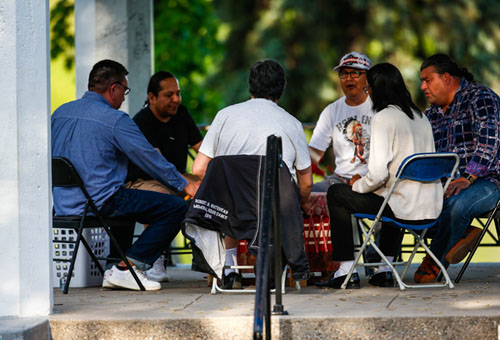


This webinar will provide a comprehensive overview of fentanyl and its analogs, focusing on the alarming rise in counterfeit and fake pills, illicit milling operations, and the evolving landscape of opioid misuse. Participants will learn how to recognize signs of opioid use and understand the physiological reasons behind the high risk of overdose associated with these potent substances.

Join us for an in-depth exploration of the Southern Ute Indian Tribe’s tüüÇai Wellness Court, a culturally grounded, community-based approach to healing and recovery within the tribal justice system. This session will showcase how the Southern Ute Wellness Court blends traditional tribal values with evidence-based practices (EBP) to create a holistic and effective response to substance use disorders among tribal members. Discussion will highlight how the core multidisciplinary team works collaboratively to guide participants through their recovery journey and how this shared commitment fosters trust, accountability and a unified vision for wellness. The session will also explore lessons learned from implementation and client success stories.

This webinar will review the benefits of a coordinated community response to alcohol and substance misuse. Attendees will learn about how providing community based holistic, wraparound, culturally responsive and comprehensive services to individuals with mental health and substance use disorders supports their recovery. Discussion will focus on the vital role tribal reentry programming plays in the recovery process and explore a continuum of care approach aimed at providing support to individuals from arrest through reentry.

Cultural components are vital for our relatives who attend treatment facilities and programs. Creating these programs requires patience and partnership between facility leadership, staff and traditional practitioners. This session will explore how to navigate common disconnects between indigenous beliefs and mainstream culture in treatment. Examine effective ways to practice connectedness in indigenous program for all clients/ Discuss strategies to engage leadership and staff in normalizing indigenous practices within daily programs.

The opioid crisis and the flood of other drugs has reached epidemic proportion in many of our communities. Join us to learn more about this national challenge and other emerging drug trends such as fentanyl, heroin, cocaine, methamphetamines, synthetic cannabinoids, and other chemicals. Explore the issues associated with the legalization of marijuana in many states and vaping, butane hash oil, and cannabis edibles. Gain an understanding of the stages of use, addiction, withdrawal symptoms, and the health and life-threatening dangers posed from the use of drugs. Discuss common delivery systems and observe examples of emerging drugs in various forms. Learn how to recognize the signs and symptoms of drug usage, as well as how Naloxone/Narcan works in cases of opioid overdoses.

When working in the addiction field, we frequently encounter clients who appear unmotivated to change. During this webinar, we will explore the concept of motivation and provide you with practical skills to develop intrinsic motivation toward long-term behavior change.

Build your own live instructor led course by combining modules (2 hours each) to produce a full day of training or spread out training sessions over several days. Completely customizable based upon your specific needs. Eleven different modules to choose from.

Implementation science is the collective study of practices and methods that significantly improve the successful implementation of new programs and practices. During this webinar, we will explore the fundamental practices and research supporting implementation science and we will learn about programs that are successfully improving services and outcomes using these best practices in the criminal justice and addiction fields.

Previous webinars have laid the foundation regarding the impact of addiction on the brain and ways to support tribal members’ journeys out of addiction. Join this session for a facilitated discussion and open forum with subject matter experts who will answer your practical questions regarding working with the impacts of addiction on the brain. Prior to the session, we will gather feedback from you about what you would like to learn about the topic from the experts. Your participation is encouraged during the session, and additional questions will be taken at that time.

Join us for a Q&A session that provides an open forum to answer practical questions regarding working with the clients who appear unmotivated to change.
